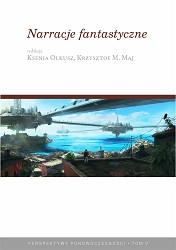Historia jako parodia. "Saga o Wiedźminie" Andrzeja Sapkowskiego
History as a Parody. Andrzej Sapkowski’s "The Witcher Saga"
Author(s): Krzysztof Uniłowski
Subject(s): History, Language and Literature Studies, Cultural history, Studies of Literature, Comparative history, Theory of Literature
Published by: Ośrodek Badawczy Facta Ficta
Keywords: Andrzej Sapkowski;The Witcher;fantasy;postmodern fantasy;new historicism;postmodernity;
Summary/Abstract: In this chapter, Krzysztof Uniłowski analyzes the function of historical allusions in Sapkowski’s pentateuch on the adventures of Geralt the Witcher and his companions. The saga is said here to allude to the Second World War, but also to the Germanic invasion of Britain in the fifth and sixth century, including the colonization of North America by Europeans. In addition, the series is viewed as featuring clear literary references to the historical novels of Henryk Sienkiewicz, Arthurian tradition, or texts based on Indian Wars. All these allusions defy Sapkowski’s allotopia and emphasize— just like the creative irony of Romanticism—the dependence of allotopian world on the writer’s creativity. At the same time, history functions like a prop room with plenty of motives, threads, and figures. From this perspective, fantasy literature confirms Fredric Jameson’s thesis that western societies have lost a sense of history. Nevertheless, in the light of peripheral character of the Polish culture, it can also mean freeing from the burden of history, or, to speak more precisely, from phantasmal imaginations. As an author, Sapkowski is conscious that we have lost the historical experience from our perceptive horizon as the most traumatogenic events of the twentieth century did not teach us anything. He further points out that what has been repressed, may always return. And it returns even in the frames of fantastic convention.
Book: Narracje fantastyczne
- Page Range: 519-533
- Page Count: 15
- Publication Year: 2017
- Language: Polish
- Content File-PDF

